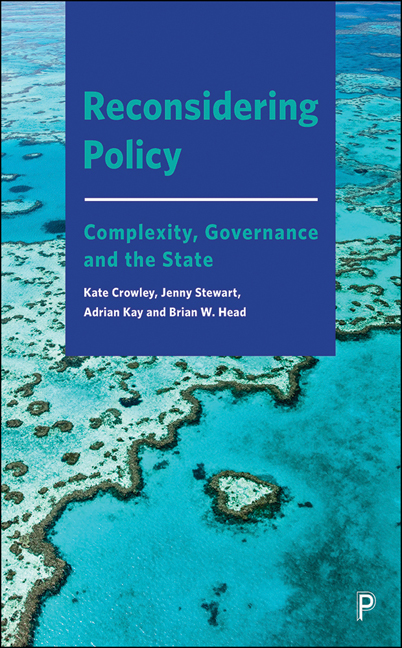Book contents
- Frontmatter
- Contents
- Detailed contents list
- List of tables
- List of abbreviations
- Notes on authors
- Preface: Re-Thinking the Policy Sciences after the ‘Governance Turn’ – Identifying and Creating a (more) Capable State
- 1 Reconsidering Policy – our Agenda
- 2 Reconsidering Policy Systems
- 3 Reconsidering Institutions
- 4 Reconsidering the State
- 5 Reconsidering Borders
- 6 Reconsidering Advice and Advisory Systems
- 7 Reconsidering Information
- 8 Reconsidering Implementation
- 9 Reconsidering Policy Change
- 10 Reconsidering Policy – our Agenda Revisited
- References
- Index
3 - Reconsidering Institutions
Published online by Cambridge University Press: 23 February 2021
- Frontmatter
- Contents
- Detailed contents list
- List of tables
- List of abbreviations
- Notes on authors
- Preface: Re-Thinking the Policy Sciences after the ‘Governance Turn’ – Identifying and Creating a (more) Capable State
- 1 Reconsidering Policy – our Agenda
- 2 Reconsidering Policy Systems
- 3 Reconsidering Institutions
- 4 Reconsidering the State
- 5 Reconsidering Borders
- 6 Reconsidering Advice and Advisory Systems
- 7 Reconsidering Information
- 8 Reconsidering Implementation
- 9 Reconsidering Policy Change
- 10 Reconsidering Policy – our Agenda Revisited
- References
- Index
Summary
The development of modern political science and public policy has tended to neglect the fact that politics and policymaking take place in the context of institutions. (Parsons, 1995: 223)
Introduction
Institutions have always been fundamental to the study of public policy, as constraining, enabling and structuring settings and influences upon policy actors and outcomes. Institutions endure, whether as the formal structures of politics and policymaking, or informal influences, routines and processes. Institutions, both formal and informal, shape policy, but they are also shaped by it. They exist within political, economic and societal contexts, and are themselves subject to overt and covert power and influence that may or may not induce change. There are many varying approaches to explaining this, and to explaining the ongoing role that institutions play in politics, society and policymaking (Rhodes et al, 2008). We see institutions as critical to understanding public policy because, as policy theory and policy challenges have advanced in complexity, so too have institutions and institutional theory kept pace through constant reinvention. We reconsider institutions here from the policy perspective with an interest in the evolution of the theory, the dynamics of institutions and institutional change in the governance era, and the problem-solving, policy-shaping role of institutions in contemporary times.
Although institutions are now central to the study of public policy, the focus upon them has shifted over time. They have been, variously, central to analysis, marginalised in analysis and, more recently, rediscovered as central, but in more complex, networked circumstances. The seminal work of ‘rediscovering institutions’, or rediscovering their study as central in political analysis, in reaction to the behaviourism and rational choice approaches, was March and Olsen's (1983; 1989). Prior to that, March and Olsen saw the discipline of political science as having been led astray by pluralistic depictions of politics as entirely society dependent, neglecting, at least in the US, the role, and the changing role, of the state (Peters, 2012). New institutional analysis is focused on understanding and improving political systems, with an emphasis upon how institutions ‘fashion, enable and constrain political actors’ (March and Olsen, 2006: 4).
- Type
- Chapter
- Information
- Reconsidering PolicyComplexity, Governance and the State, pp. 33 - 54Publisher: Bristol University PressPrint publication year: 2020

